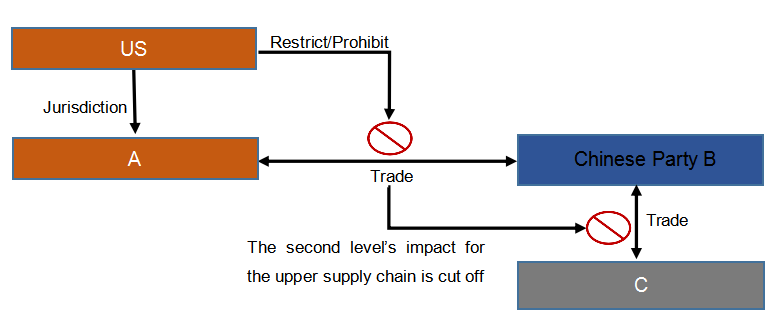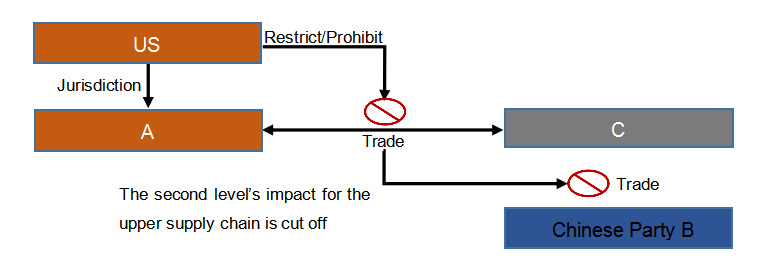Blocking Long-arm Jurisdiction: Brief Interpretation of the Rules on Counteracting Unjustified Extraterritorial Application of Foreign Legislation and Other Measures
I. Introduction
In 1955, the first long-arm statute was enacted in Illinois, U.S. Ever since then, the U.S. government has begun to improperly intervene other countries’ international economic and trade activities by exercising its jurisdiction over foreign countries and regions based on the "minimum contacts principle", which is also known as “Long-arm Jurisdiction”. Furthermore, U.S. even imposes stern sanctions on the countries or regions that do not comply with the U.S. laws. Such acts gravely violate sovereign equality and other basic principles of international law. Under these circumstances, many countries and regions have countered through legislations. Among them, the legislation of the EU is a typical example. As early as 1996, EU issued Regulation 2271/96 (the “Blocking Statute”) to counteract the unilateral sanctions imposed by the U.S.
With the development of China for years, the unilateral "long-arm jurisdiction" act of the U.S. has exerted rather negative impact on the normal international economic and trade exchanges of Chinese citizens, legal persons and other organizations (hereinafter referred to as “a Chinese Party” or "Chinese Parties"). In order to block the effects of the U.S. long-arm jurisdiction and provide a remedy mechanism for the Chinese Parties suffering from unjustified extraterritorial application of foreign legislation, the PRC Ministry of Commerce (MOFCOM) issued the Rules on Counteracting Unjustified Extraterritorial Application of Foreign Legislation and Other Measures (hereinafter referred to as “the Rules”) on January 9, 2021.
II. The Content of Counteracting Rules
Compared with the EU‘s Blocking Statute which has the top legal force in the EU, the Rules only has 16 articles and was issued by a department of the State Council of China. That means although the Rules can be used as the basis for adjudication, its legal force is lower than the laws and administrative regulations under the Chinese legal hierarchy system. Considering the traditional Chinese judicial practice of "exploring the road by rules”, it is believed that the Rules aims to construct a principal framework of the Chinese blocking mechanism and will be replaced by other types of legislation that have higher legal force in China in the future.
1. Application Scope of Counteracting Rules
Article 2 of the Rules provides that “the Rules apply to situations where the extraterrestrial application of foreign legislation and other measures, in violation of international law and the basic principles of international relations, unjustifiably prohibits or restricts the citizens, legal persons or other organizations of China from engaging in normal economic, trade and related activities with a third State (or region) or its citizens (hereinafter referred to as “third State’s Parties”), legal persons or other organizations. This means that the Rules only applies when the international economic and trade activities between Chinese Parties and the third State’s Parties are improperly prohibited or restricted by foreign legislation, which is also known as “secondary sanctions”. See Part III for further analysis.
It is important to note that although the Rules primarily target on the U.S. unilateral "long-arm jurisdiction", the Rules does not aim to undermine the normal international economic and trade orders and the Chinese government still follows the basic principles. Hence the Rules is a “defensive” countermeasure rather than an "offensive" one.
2. The Competent Authorities of the Rules
Article 4 of the Rules establishes a working mechanism for joint participation of multiple departments. In accordance with China’s legal practice and the Rules, it is understood that the working mechanism will be led by MOFCOM, in cooperation with the Legal Work Committee of the National People’s Congress, the Supreme People’s Court, the Development and Reform Commission, the Ministry of Foreign Affairs, and the Ministry of Justice. In case of specific matters, the specific departments such as the Ministry of Transport and the Ministry of Ecology and Environment will also participate.
3. The Blocking Mechanism of the Rules
(1) Report
Pursuant to Article 5 of the Rules, “Where a Chinese Party is prohibited or restricted by foreign legislation and other measures from engaging in normal economic, trade and related activities with third State’s Parties, he/it shall truthfully report such matters to the competent department of commerce of the State Council within 30 days. The matters reported shall be kept confidential by the competent department of commerce of the State Council and its staff members if so requested”. 4 points need to be noted.
(a) The reporter shall be a Chinese Party. The legislative purpose of the Rules is to protect “the legitimate rights and interests of Chinese Parties.” Therefore, only Chinese Parties can report to the competent departments.
(b) Reporting is an obligation as opposed to a right. The Chinese Parties are required to report when they are prohibited or restricted by foreign legislation and other measures from engaging in normal economic, trade and related activities with third State’s Parties. A Chinese Party failing to report will be subject to penalties, including administrative fines, an order or a warning, in accordance with the Rules.
(c) The report shall include foreign laws themselves and improper restrictive or prohibited measures exercised in foreign countries, containing judgments, rulings and other legal documents enacted by foreign judicial institution or legally effective documents made by other agencies, such as being blacklisted for export control or trade sanctions.
(d) The recipient of the report is MOFCOM.
(2) Issuing an injunction
Article 7 provides that MOFCOM may decide to issue an injunction against the recognition, enforcement, or compliance with the relevant foreign laws and measures. Different from the Blocking Statute of the EU, which clearly defines the subject of blocking as an annex, the Rules adopts a flexible way. Article 6 of the Rules lists the factors that shall be considered and evaluated:
(a) whether international law or the basic principles of international relations are violated;
(b) potential impact on China’s national sovereignty, security and development interests;
(c) potential impact on the legitimate rights and interests of the citizens, legal persons or other organizations of China;
(d) other factors that shall be taken into account.
This approach is more in line with Chinese legal practice and the nature of the Rules as a departmental regulation.
(3) Exemption
Article 8 puts that Chinese Parties may apply for exemption from the injunction. Only in this can a Chinese Party be exempted from complying with an injunction; otherwise, he/it shall take responsibility under Article 13 as mentioned above. It further proves that the Rules is not to compete with "long-arm jurisdiction" of the U.S., or to impede the exercise of sovereignty of other countries nor the normal order of international trade. It offers a safeguard measure to the Chinese Parties to safeguard their legitimate rights and interests when they cannot conduct equal and free economic and trade activities overseas.
(4) Judicial Remedy
Article 9 contains judicial remedies for Chinese Parties suffering from the inappropriate extraterritorial application of foreign laws. There are two scenarios where the Chinese Parties may file a lawsuit:
(a) where a party, either from China or other countries, complies with the foreign law or measure within the scope of an injunction, resulting in infringement upon the legitimate rights and interests of Chinese Parties;
(b) where a party, either from China or other countries, has benefited from a judgment or ruling made in accordance with a foreign law or measure within the scope of an injunction, as a result of which, the Chinese Parties have suffered losses.
(5) Administrative Support
According to article 11 of the Rules, if a Chinese Party “in accordance with an Injunction, fails to comply with the relevant foreign laws or measures and thereby suffers great losses, the relevant department may give necessary support in light of the specific circumstances”, and according to the reply from MOFCOM, the Rules will provide judicial remedies for Chinese Parties whose legitimate rights are violated. Also, departmental support will be given on a case by case basis. Although there are currently no corresponding implementing measures or cases, based on China’s practice, this type of support may include the guidance and other services to help Chinese Parties dealing with their rights protection, special windows for policy consultation or green channels for the report, lower administrative examination and approval standards, and possibly tax reductions or exemptions if necessary.
III. The Application of the Rules
The application of the Rules may be illustrated through the following 4 scenarios.
1.
A U.S. entity A and a Chinese Party B used to have normal economic and trade deals with each other, but due to a restriction of the U.S. domestic law, if A continues to cooperate with B, it will suffer huge losses. Therefore, A chooses not to cooperate with B anymore.

Provided that there exists a contract, B could sue A for breach of contract. However, in this case, the court could not issue an injunction under the Rules against the restriction imposed by the U.S., since there is no party from a third country involved.
2. A U.S. entity A and a Chinese Party B used to have normal economic and trade deals with each other. The trading between B and C is based on the relation between A and B. C is an entity in a third country. If A continues to trade with B, A itself will suffer huge losses due to the restrictions imposed by the U.S. For that reason, A chooses not to trade with B anymore which impacts the economic and trade activities between B and C.

Under this circumstance, B suffering from the restrictions is not only in the relation with A, but also in the relation with C. If such prohibitions or restrictions negatively affect the economic trade between B and C, i.e., C chooses not to deal with B due to A’s action, then the legitimate rights of Chinese entity will be infringed. In this case, the Rules may apply to C’s action.
3. The U.S. restricts or prohibits trade between A and a third country entity C. The trading between B and C is based on the relation between A and C.

In this scenario, the trade between B and C is restricted since the U.S. imposes prohibitions on the trade between A and C. If C refuses to perform its obligations to B simply due to such restrictions or prohibitions imposed by the U.S., then the legitimate rights of B will be severely infringed. In this case, the Rules will applies to C.
4. The direct long-arm jurisdiction of the U.S. restricts or prohibits the normal economic activities between a Chinese Party B and a third country entity C.

This scenario falls into the scope that the Rules exactly intends to block. The U.S. has no jurisdiction over B or C. Nevertheless, the U.S. exercises long-arm jurisdiction based on the "minimum contacts principle". This behavior apparently violates the principle of sovereign equality and will definitely be governed by the Rules. B shall report to MOFCOM in accordance with the Rules and after getting an injunction from the Ministry of Commerce, B may sue any party benefited from the judgment or ruling in the U.S.
IV. Conclusion
To sum up, the Rules is a pilot departmental regulation, which fully respects the principles of international laws and the normal order of international economic and trade activities. The main purpose of the Rules is to formulate a blocking mechanism against the long-arm jurisdiction and safeguard the legitimate rights of Chinese Parties. Meanwhile, the promulgation of the Rules also shows that Chinese government is determined to safeguard sovereignty, security and interests of development through legislation.
For both Chinese and overseas companies, implementing the Rules will certainly bring new opportunities and challenges for investment and business development. Thus, the companies shall build up a corresponding compliance system pursuant to the Rules and keep closely monitoring any further detailed implementing measures of the Rules.
